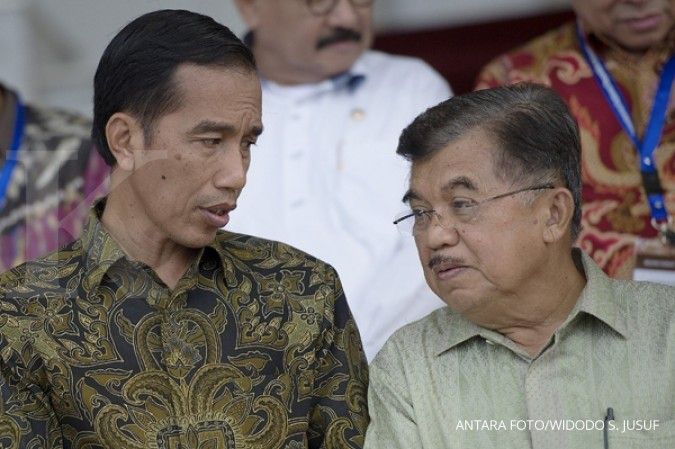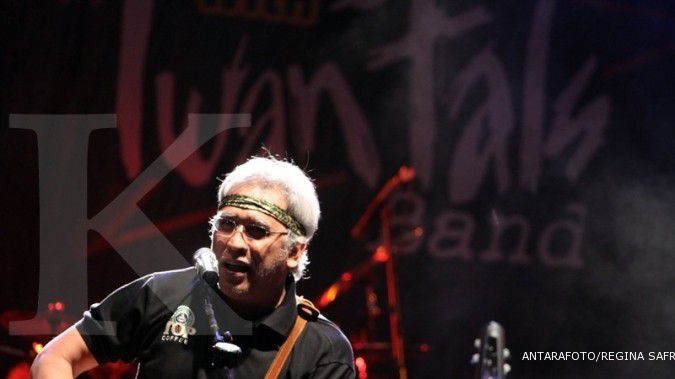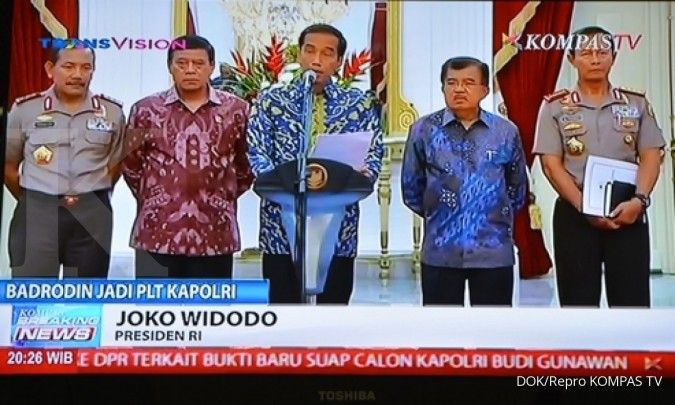JAKARTA. In what appears to be a time-buying strategy, President Joko “Jokowi” Widodo has held yet more discussions over possible solutions to the recently escalating tension between the National Police and the Corruption Eradication Commission (KPK), summoning a number of high-profile figures to the State Palace on Sunday night.
“We agreed that the KPK and the National Police should maintain their dignity like other law enforcement institutions, such as the Attorney General’s Office and the Supreme Court,” Jokowi said during a press conference after holding the one-hour closed-door meeting.
The summoned figures included former KPK commissioner Tumpak Hatorangan Panggabean, former Constitutional Court chief justice Jimly Asshiddiqie and former National Police deputy chief Comr. Gen. Oegroseno, who strongly condemned his former office’s move to arrest KPK commissioner Bambang Widjojanto.
On Friday, Jokowi had likewise summoned KPK and police leaders and some of his Cabinet members to discuss the conflict between the two institutions. After that he issued a similar statement, asking the KPK and the police to settle their conflicts amicably.
“Therefore, there should not be criminal allegations made against the KPK and National Police officers and the legal processes at the two institutions must be conducted in transparent ways without any intervention,” Jokowi said Sunday.
Jimly said that the invitation of the figures was an initial step toward establishing an independent team to monitor the current situation between the KPK and the National Police.
Meanwhile, in an attempt to seek protection from the police, KPK commissioner Adnan Pandu Praja urged the President on Sunday to issue a government regulation in lieu of law (Perppu) that would grant immunity from criminal prosecution to KPK commissioners until their tenures end in December.
Adnan said on Sunday that such a regulation would protect KPK leaders from any prosecution that could prevent them from completing high-profile graft cases during their remaining 11 months in office.
“We need such an immunity as we are powerless facing the current charges of criminality. It is not meant to make us untouchable, but please wait until we are done with our jobs at the KPK,” Adnan said.
On Friday, KPK chairman Abraham Samad telephoned Indonesian Military (TNI) chief Gen. Moeldoko, asking for protection from the police. His move was widely criticized by the public.
Police arrested Bambang after naming him a suspect for allegedly, in his former capacity as a lawyer, demanding a witness falsify testimony in a West Kotawaringin election dispute in 2010. Police on Saturday then processed a report that accused Adnan of fraud for allegedly illegally taking over the shares of logging company, PT Desy Timber, in Berau, East Kalimantan.
While no reports have yet been filed against another KPK commissioner, Zulkarnain, he is also open to being accused of criminality as his opponents recently alleged he tampered with a graft case while he served as East Java’s chief prosecutor in 2009.
“The attacks against us are engineered to prevent us from stepping up our investigations into high profile graft cases. We are ready to face any prosecution after we finish our terms,” Pandu said.
Former law and human rights deputy minister Denny Indrayana, who is also a legal expert with Gadjah Mada University in Yogyakarta, agreed.
He said that immunity is a special privilege, which can be regulated by international standards, to ensure that the officials of anticorruption organizations can be protected from criminal charges during their tenures.
“Criminal allegations being levied against the leaders of antigraft bodies does not only take place in Indonesia but also elsewhere in the world,” Denny said.
The first major confrontation between the police and the KPK occurred in 2009 when two of the antigraft body’s leaders, Bibit Samad Rianto and Chandra Martha Hamzah, were named bribery suspects by the police in cases that were never proven.
The clash resurfaced in 2012 when the KPK declared Insp. Gen. Djoko Susilo a bribery suspect, which consequently lead the police to surround the KPK headquarters to arrest Novel Baswedan, the commission’s chief investigator in Djoko’s case, for allegedly committing a crime.
Separately, another KPK commissioner, Zulkarnain, said multiple attacks on the antigraft body would not prevent KPK investigators from stepping up their investigation into Budi and he called on the police generals who skipped being questioned last week to give testimony at the KPK headquarters.
“We are committed to finish Budi’s investigation. Thus, we call on all witnesses from the police to heed the summonses and properly give their testimonies,” Zulkarnain said. (Haeril Halim)
Jokowi buys time in KPK row
January 26, 2015, 10.23 AM
/2014/12/03/1140831517.jpg)
ILUSTRASI. Yuk simak cara menata ruang tidur anak supaya bisa fokus belajar berdasarkan Feng Shui
Source: The Jakarta Post
| Editor: Hendra Gunawan
Latest News
-
March 02, 2026, 04.45 PM
Indonesia has Seized 5 Million Hectares of Palm Oil Plantations, Task Force Says
-
March 02, 2026, 01.10 PM
Asian Assets Slide as Mideast Strikes Spark Oil Spike, Haven Rush
-
March 02, 2026, 10.49 AM
Bank Indonesia Monitoring Market Movements in Response to Conflict in Middle East
-
February 25, 2026, 08.28 PM
Inpex to Solicit Bids for Construction of Indonesia's Abadi LNG Project in Mid-2026
-
February 24, 2026, 03.38 PM
Eni to Reach Final Investment Decision for Indonesia Gas Projects Next Month
-
February 24, 2026, 01.00 PM
Asia Stocks Try to Steady after Wall Street Selloff Sims Mood
-
February 23, 2026, 04.50 PM
Wall Street Futures and Dollar Slide on Trump Tariff Tumult
-
February 23, 2026, 02.17 PM
Indonesia's Government Spending Jumps 26% in January 2026
-
February 23, 2026, 01.47 PM
Indonesia's Government Spending Jumps 26% in January












